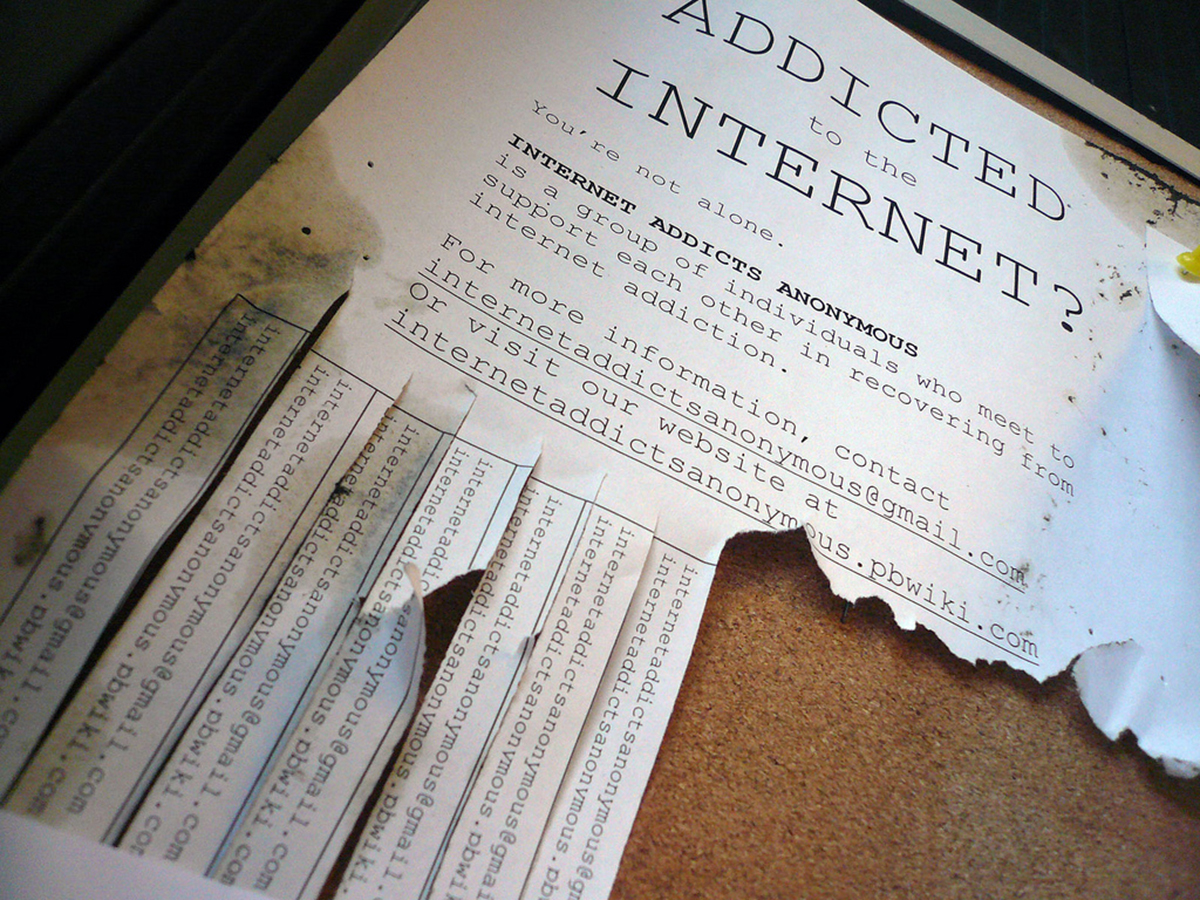"Is internet addiction really a real thing?" many people ask themselves upon hearing the word, something that might well happen as they leisurely browse the internet while they should actually be doing something else, and inadvertently stumble upon an article just like this one. The answer is a resounding "you bet". Internet addiction is also known as computer addiction, online addiction, and Internet addiction disorder (IAD), and it is ruining many lives as we speak.

In fact, I'd venture to say that we all display signs of it at times: instead of working, doing the laundry, or answering that important email we're not quite sure how to word, we linger on Facebook just a little too long, browse the news, or play a quick game of something or another. Internet addiction isn't like an addiction to drugs, nicotine, or alcohol, things everyone knows are inherently bad for us. Internet addiction is more like binge eating. Everyone needs food, and binge eaters are no exception. They just don't know when to stop, or know but continue anyway.
The internet is an integral and in many cases essential part of modern life — in many cases, we depend on it for our income, banking, or communication with people who are important to us. An internet addiction occurs when using this wonderful modern medium gets out of hand. It's an impulse control disorder, basically. People may use the world wide web to escape a difficult and painful reality as well — something that may well have happened to the Korean couple mentioned above. Their baby was born prematurely. Were they perhaps suffering from PTSD, and used the internet as a particularly horrendous coping tool?
First, though, you'll need to assess the extent of your problem.
Internet Addiction: The Red Flags
- You are online a lot, and for a lot longer than you intend to be.
- You feel guilt about the amount of time you spend online.
- You often think about online activities when you're offline.
- You neglect other tasks (work, school, your household, loved-ones) in order to spend time on the internet, and your internet use significantly and negatively impacts your day to day life.
- Your time online is spent doing things you don't need to be doing: working, ebanking, or communicating meaningfully with relatives or friends who live far away doesn't count. We're talking about endless browsing on Facebook, Pinterest, and similar sites, and playing online games.
- Attempts to wean yourself off the internet have repeatedly failed.
- You need more and more time online to satisfy your needs.
- Your internet use is escapism from reality.
See Also: Facebook Addiction, And What To Do About It
"Internet addiction" is not currently included in the Diagnostic and Statistical Manual of Mental Disorders, the tool mental health professionals use to make diagnoses. However, compulsive behaviors associated with it are certainly recognized as a problem. Specific activities include online gambling, obsessive gaming, compulsive online shopping, and internet pornography. "Simply" spending hours and hours engrossed in pointless online browsing can certainly prove to be addictive in nature, whether or not the DSM currently recognizes that, and psychologists can certainly work with people who are addicted to the internet.
Overcoming An Internet Addiction: Can You Do It?
As with any addiction, the first step towards overcoming an internet addiction is recognizing that you have a problem. An internet addiction can impact your relationships with people you love, affect your performance at work, and isolate you from society — often, ironically, as you spend time on so-called social networks such as Facebook. Your partner and children may complain about your frequent internet use, and you may choose to spend time online rather than engaging in real-life social opportunities.

A Korean study into the effects of internet addiction even found that addicts may lose their jobs, have their marriages break down, experience academic failure and find themselves in debt. Kimberly Young, who studied the topic extensively, also found that internet addicts often suffer from other underlying mental disorders, most commonly depression. It's easy to see why: some people find that they have confidence they don't have in real life while they are on the internet. They may create different online personas and some say they lead "secret lives" on the web.
- Suffer from other mental health problems such as Post Traumatic Stress Disorder, depression, anxiety, obsessive compulsive disorder, or agoraphobia.
- Lack social skills or social support.
- Are teenagers.
- Suffer from reduced mobility.
- And I'm pretty sure people whose jobs are internet-based, so they need to spend lots of time online for professional reasons, can get sucked in to addictive behavior on the internet more easily.
Steps Towards Healing
If you believe you are showing signs of a mild internet addiction that has not reached a pathological level, you may be able to handle the issue yourself. Tell everyone, including people on online communities you are almost certainly part of, that you are going to take a break from compulsive internet use. Commit to only using the web for things you need to be doing, things like professional tasks, ebanking, and studying. Set up offline activities that will keep your mind off the web. Turn your modem off after a certain time. Read good books, and interact with real people.
See Also: Sitting Is Killing You - What You Can Do About It?
- Examining the reasons behind your pathological internet use.
- Finding out what your triggers are: when do you spend more time online, and why?
- Making goals that limit your internet use. Set a timer and turn your modem off, something you can set up to happen automatically.
- Building an offline support network.
- Finding healthier ways to deal with stress and anxiety. Fill your day with meaningful offline activities.
- Speaking to a psychologist about Cognitive Behavioral Therapy (CBT) sessions to help you overcome your internet addiction, and also looking into attending an offline (!) support network for internet addicts.
- Photo courtesy of James Cridland via Flickr: www.flickr.com/photos/jamescridland/2769699053
- Photo courtesy of Mandiberg via Flickr: www.flickr.com/photos/theredproject/3686402702


Your thoughts on this